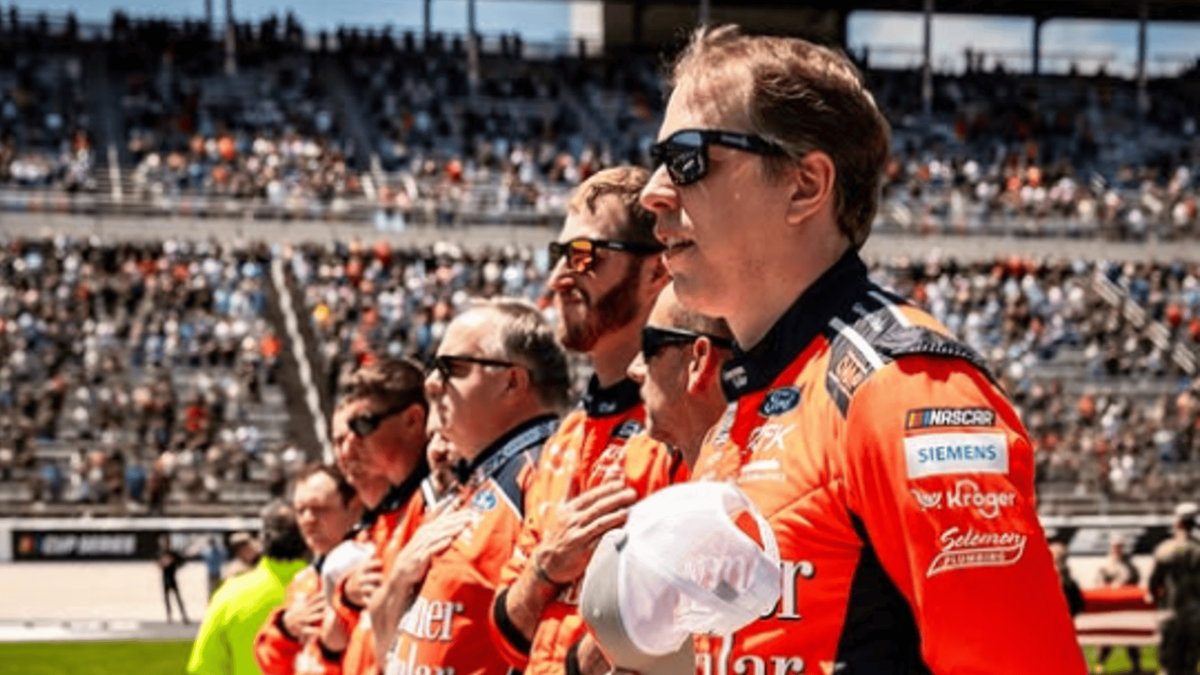May 9, 2025 | 2:17 PM EDT




“You want it to be better, being a home track and having so many friends and family come out to that one,” said Chris Buescher as the Texas Motor Speedway was brimming with hometown pride. The Fort Worth native tore through the field in his No. 17 Ford for RFK Racing. The 267-lap race was a high-stakes battle, and Buescher was in the thick of it, running third on lap 161, just 0.972 seconds behind leader Kyle Larson. But in a heartbeat, his dream of a Texas triumph unraveled.
Watch What’s Trending Now!
A blown right rear tire forced him to limp to the pits, and the tire’s carcass rolled across the track, triggering a caution on lap 162. As the first car a lap down, the RFK racer seemed poised to claim the free pass—the “lucky dog” rule that lets the first car one lap behind rejoin the lead lap. But a controversial NASCAR call left him stranded, sparking debate and heartbreak. Let’s dive deep into the chaos and uncover why #17 Ford was denied his shot at redemption.
Mike Forde clarifies the Chris Buescher situation
Buescher had been a force all day, showcasing the speed and grit that made him a fan favorite. By lap 159, he was locked in a tight battle with Larson and Tyler Reddick, holding third place with an average running position of 3.52 and logging 23 of the race’s fastest laps. The debris from his tire brought out the fourth caution of the day, halting the field after nine lead changes among seven drivers. Buescher, now a lap down, expected the free pass, especially since the caution was officially listed as debris. Yet, NASCAR ruled against him, leaving fans and analysts puzzled.
So, what went wrong? The Hauler Talk podcast dove into the controversy, with host Nate Ryan pressing NASCAR insider Mike Forde for answers. Forde’s response was definitive: “That was because he was under penalty. So if you’re under penalty, you cannot receive the free pass. The bumper cam view pretty clearly showed that all four tires were not under the commitment box, so therefore it was a commitment line violation. He was under penalty and didn’t get the free pass there. It’s a cut-and-dry call for us in Race Control.”
The free pass rule is a lifeline for drivers who fall a lap behind, and Buescher appeared to meet the criteria. The fact that the caution stemmed from his tire debris made the denial even more baffling. Later, on lap 173, he did receive the free pass under a separate caution caused by a multi-car incident involving Bubba Wallace, AJ Allmendinger, Alex Bowman, Noah Gragson, and Chad Finchum. But the earlier miss on lap 162 was a pivotal blow, costing him valuable track position in a race where every lap mattered.
Host Ryan added clarity, noting, “If you’re not the first car a lap down when the button is struck, you don’t get it. It’s whoever’s the first car a lap down when the yellow is hit, at the time of caution”
NASCAR’s strict pit road rules require all four tires to cross the commitment box when entering the pits. #17’s car failed to comply, likely during the chaotic pit stop following his tire failure, saw him placed under penalty, automatically disqualifying him from the free pass. This ruling, while technically correct, felt like a double punishment for a driver already grappling with bad luck. Despite the setback, he clawed his way to an 18th-place finish, a testament to RFK Racing’s resilience amid a race that saw 15 lead changes, 10 cautions for 65 laps, and fierce battles among drivers like Larson, Reddick, and eventual winner Joey Logano, who crossed the finish line on lap 267.
As Buescher looks to future races, the Texas disappointment lingers, but his fight is far from over. His 18th-place finish, though far from the podium, showed the grit that defines RFK Racing. The Texas Motor Speedway may not have delivered the hometown glory he craved, but #17 Ford’s heart and hustle promise more battles ahead.
The drop only stung more for Buescher, as he later explained. “We’ve had really good runs that just haven’t ended well. You want it to be better, being a home track and having so many friends and family come out to that one. It takes a little extra out of you not to be able to seal the deal there.”
For now, Buescher has some unsettled business to finish at the next race.
Buescher has an even more stinging history with the upcoming Kansas track
The sting of defeat still burns for RFK Racing’s Chris Buescher after a gut-wrenching loss to Kyle Larson at Kansas Speedway last year. Buescher, who led with confidence, was edged out by a mere 0.001 seconds—the closest finish in NASCAR history. “It just hurts,” No.17 Ford had admitted. The Kansas race was a rollercoaster. Buescher fought hard, believing he had the win secured. But Larson’s last-second surge stole the victory, leaving the RFK driver replaying the moment in his mind.
“You can change your day without having to wait 50 laps to come in, pit, and throw a wrench in the rear glass or throw air pressure to it.” shared Buescher. The loss hit deep, not just for him but for the entire RFK team, who poured everything into that race. Despite the heartbreak, RFK Racing is channeling the pain into purpose. Team co-owner Brad Keselowski sees the defeat as fuel for redemption.
Buescher, too, is looking ahead. RFK’s grit and unity shine through, with the team rallying around their driver. Fans feel the emotion, rooting for Buescher to claim the win that slipped away. As Kansas looms, RFK Racing carries the weight but also the hope of a breakthrough.



